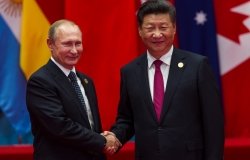Zoellick's New Zealots? Trading Blocs in Asia
Vinod K. Aggarwal, University of California at Berkeley and Woodrow Wilson Center; Commentators: Gary Clyde Hufbauer, Institute for International Economics; Paula Stern, Stern Group, Inc
Overview
At the turn of the new millennium, a growing number of East Asian countries have begun to pursue bilateral trade agreements, apparently in partial imitation of the U.S. zeal for such accords. According to Vinod Aggarwal, the plethora of bilateral and sector-specific accords threatens to distort the overall health of the trading system.
Aggarwal challenged the widespread theory that any kind of liberalization?even of narrow sectors or limited geographic scope?will necessarily lead to wider liberalization in the long run. Certain types of arrangements (though not all) may end up in conflict with the World Trade Organization's comprehensive approach. For example, the Information Technology Agreement (ITA), which eliminates IT tariffs, allows high-tech executives to disengage from the larger debate over free trade. That is, free-trade allies are "bought off," leaving the field in Washington to those lobbying for protectionist causes. Aggarwal calls it "buying off the winners"
Country-specific accords can also have deleterious effects, and are sometimes shortsighted. For example, a developing country may reap "rewards" for cooperating in the war on terrorism though special market privileges, just to find its favorable position undermined by new U.S. agreements down the road. Such piecemeal liberalization sometimes causes distortion and inefficient investment that cannot necessarily be rechanneled quickly. While bilateral accords have certain advantages over multi-country agreements?they face fewer political stumbling blocks and can be implemented more quickly, for example?leaders must pay more attention to formulating a comprehensive long-term vision for free trade.
Gary Hufbauer of the Institute of International Economics and Paul Stern of Stern, Inc., offered comments on Aggarwal's presentation. Both agreed that governments are sometimes overzealous in pursuing bilateral and sector-specific agreements. However, Hufbauer pointed out that world trade statistics are still quite robust, and do not indicate that bilateral agreements will prove pernicious. He also countered Aggarwal's suggestion that the IT "winners" are losing interest in overall liberalization. Silicone Valley is heavily involved in outsourcing labor and importing raw materials?activities that remain beyond the boundaries of the ITA.
Paula Stern maintained that narrow agreements are sometimes the only ones possible politically?what is wrong with reaching for the low-hanging fruit if you don't yet have a ladder to reach the top branches? Moreover, any liberalization has a positive "demonstration effect." However, both she and Hufbauer commented that they found much good sense in Aggarwal's arguments and they look forward to hearing more as he continues to research the evolution of the trading system.
Robert Hathaway, Asia Program Director, 691-4012
Drafted by Amy McCreedy
Hosted By

Indo-Pacific Program
The Indo-Pacific Program promotes policy debate and intellectual discussions on US interests in the Asia-Pacific as well as political, economic, security, and social issues relating to the world’s most populous and economically dynamic region. Read more
Thank you for your interest in this event. Please send any feedback or questions to our Events staff.










